| Listing 1 - 10 of 42 | << page >> |
Sort by
|
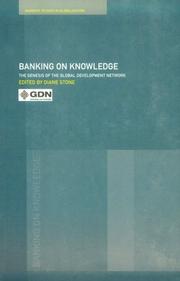
ISBN: 0415248485 0415248477 0203378180 1280046481 0203361423 1134536941 9780203361429 9780415248471 9780415248488 9786610046485 6610046484 9781134536948 9781134536894 1134536895 9781134536931 1134536933 Year: 2000 Publisher: London Routledge
Abstract | Keywords | Export | Availability | Bookmark
 Loading...
Loading...Choose an application
- Reference Manager
- EndNote
- RefWorks (Direct export to RefWorks)
Banking on Knowledge is one of the first studies of how the World Bank is reinventing itself as the 'Knowledge Bank'. The book addresses how international organizations and governments are developing partnerships with think tanks, research institutes and other knowledge institutions in the hope of informing and improving policies for reform and development around the world.The book focuses on the recently established Global Development Network (GDN). The GDN is a new and ambitious initiative, sponsored by the World Bank, which is possibly the largest worldwide non-governmental
International finance --- Economic policy and planning (general) --- Third World: economic development problems --- World Bank --- Economic development --- -Communication in economic development --- #SBIB:022.IOS --- #SBIB:327.7H43 --- #SBIB:327.1H10 --- #SBIB:33H071 --- Development, Economic --- Economic growth --- Growth, Economic --- Economic policy --- Economics --- Statics and dynamics (Social sciences) --- Development economics --- Resource curse --- Research --- Specifieke internationale organisaties en samenwerking: economie --- Internationale betrekkingen: theorieën --- Economische internationale betrekkingen --- AA / International- internationaal --- 338.340 --- 333.164.0 --- NBB congres --- Algemene ontwikkeling in de Derde Wereld. --- Internationale Bank voor Herstel en Ontwikkeling: algemeen. --- Conferences - Meetings --- Communication in economic development. --- Research. --- Economic development. --- Policy sciences. --- Research institutes. --- Business & Economics --- Economic Theory --- Communication in economic development --- Developing countries: economic development problems --- Internationale Bank voor Herstel en Ontwikkeling: algemeen --- Algemene ontwikkeling in de Derde Wereld
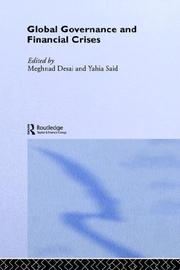
ISBN: 0415305292 0203352610 1138810835 1280024690 0203713214 1134405693 0429234775 9780203713211 9786610024698 6610024693 9781134405688 1134405685 9781134405695 9781134405640 1134405642 9781138810839 0203342844 9780203342848 9780415305297 9780429234774 9781280024696 Year: 2005 Publisher: London Routledge
Abstract | Keywords | Export | Availability | Bookmark
 Loading...
Loading...Choose an application
- Reference Manager
- EndNote
- RefWorks (Direct export to RefWorks)
The editors of this book have pulled together a collection of chapters that review the spate of financial crises that have occurred in recent years starting with Mexico in 1994 and moving on to more recent crises in Turkey and Argentina. With impressive contributors such as Douglas Gale, Gabriel Palma and Andrew Gamble, the book is a timely and authoritative study. Global Governance and Financial Crises provides a new understanding of this important area with a combination of economic history and political economy as well as the most recent developments in analytical economic theory.
AA / International- internationaal --- ASI / Asia - Azië - Asie --- LAM / Latin America - Latijns Amerika - Amérique Latine --- LDC / Developping Countries - Pays En Développement --- 333.613 --- 336.311.2 --- 339.115 --- 333.164.0 --- 333.432.8 --- 382.11 --- Activiteiten van de nationale en internationale markten. Beursnoteringen van aandelen en obligaties. --- Buitenlandse leningen van de overheid. --- Buitenlandse schuld. Debt Equity Swap in LDC. --- Internationale Bank voor Herstel en Ontwikkeling: algemeen. --- Internationale monetaire organisatie. Internationaal Muntfonds. Algemene leningovereenkomsten. --- Theorie van het internationale evenwicht. Economische onafhankelijkheid van een natie. Globalisering. Mondialisering. --- Money. Monetary policy --- International finance --- Developing countries --- Financial crises --- Monetary policy --- International monetary system --- International money --- Finance --- International economic relations --- Internationale Bank voor Herstel en Ontwikkeling: algemeen --- Internationale monetaire organisatie. Internationaal Muntfonds. Algemene leningovereenkomsten --- Activiteiten van de nationale en internationale markten. Beursnoteringen van aandelen en obligaties --- Buitenlandse leningen van de overheid --- Buitenlandse schuld. Debt Equity Swap in LDC --- Theorie van het internationale evenwicht. Economische onafhankelijkheid van een natie. Globalisering. Mondialisering --- Economic conditions. --- International finance.
Book
ISBN: 9780521198950 052119895X 9780511762710 9781107407046 1107407044 1107215234 0511849273 9786612818240 051191783X 051191685X 051191881X 0511913257 0511762712 1282818244 0511915047 9780511918810 Year: 2010 Publisher: Cambridge : Cambridge University Press,
Abstract | Keywords | Export | Availability | Bookmark
 Loading...
Loading...Choose an application
- Reference Manager
- EndNote
- RefWorks (Direct export to RefWorks)
As pillars of the post-1945 international economic system, the International Monetary Fund (IMF) and the World Bank are central to global economic policy debates. This book examines policy change at the IMF and the World Bank, providing a constructivist account of how and why they take up ideas and translate them into policy, creating what we call 'policy norms'. The authors compare processes of policy emergence and change and, using archival and interview data, analyse nine policy areas including gender, debt relief, and tax and pension reform. Each chapter traces the policy norm process in order to shed light on the main sources and mechanisms for norm change within international organizations. Owning Development details the strength of these policy norms which emerge, then either stabilize or decline. The book establishes valuable insights into the strength of current development policies propounded by international organizations and the possibility for change.
Economic development. --- Economic policy. --- International Monetary Fund. --- World Bank. --- AA / International- internationaal --- 333.164.0 --- 333.432.8 --- 338.340 --- Internationale Bank voor Herstel en Ontwikkeling: algemeen. --- Internationale monetaire organisatie. Internationaal Muntfonds. Algemene leningovereenkomsten. --- Algemene ontwikkeling in de Derde Wereld. --- Economic development --- Economic policy --- Economic nationalism --- Economic planning --- National planning --- State planning --- Economics --- Planning --- National security --- Social policy --- Development, Economic --- Economic growth --- Growth, Economic --- Statics and dynamics (Social sciences) --- Development economics --- Resource curse --- Internationale Bank voor Herstel en Ontwikkeling: algemeen --- Internationale monetaire organisatie. Internationaal Muntfonds. Algemene leningovereenkomsten --- Algemene ontwikkeling in de Derde Wereld --- Internationaal monetair fonds --- International monetary fund --- IMF. --- Social Sciences --- Political Science --- Világbank --- Banque internationale pour la reconstruction et le développement --- Mezhdunarodnyĭ bank dli︠a︡ rekonstrukt︠s︡ii i razvitii︠a︡ --- MBRR --- Sekai Ginkō --- Kokusai Fukkō Kaihatsu Ginkō --- Kukche Puhŭng Kaebal Ŭnhaeng --- Segye Ŭnhaeng --- IBRD --- Welt Bank --- Weltbank --- Banque mondiale --- Internationale Bank für Wiederaufbau und Entwicklung --- Banco Internacional de Reconstrucción y Fomento --- Banco Mundial --- B.I.R.D. --- BIRD --- Banca Internațională pentru Reconstrucție și Dezvoltare --- Mirovoĭ Bank --- Svitovyĭ Bank --- Svitovyĭ bank rekonstrukt︠s︡iï i rozvytku --- Verdensbanken --- Międzynarodowy Bank Rozwoju i Odbudowy --- Bank al-Dawlī lil-Inshāʼ wa-al-Taʻmīr --- Bank al-Dawlī --- Världsbanken --- Banca ricostruzione e sviluppo --- Banca di ricostruzione e sviluppo --- BIRF --- I.B.R.D. --- B.I.R.F. --- Shih chieh yin hang --- Shi jie yin hang --- International Bank for Reconstruction and Development --- World Bank Group. World Bank --- Thanākhān Lōk --- Bank Światowy --- Viśva Baiṅka --- Lōka Băṅkuva --- Ngân hàng Thế giới --- Vsemirnyĭ Bank --- Bank Dunia --- Msopʻlio Bankis --- Banca Mondială --- BM --- Prapañca Byāṅku --- Banca mondiale --- Banca internazionale per la ricostruzione e lo sviluppo --- Dhanāgār Bibhab Lok --- البنك الدولي --- بنك الدولي --- 世界銀行 --- 世界银行 --- 国際復興開発銀行 --- Dėlkhiĭn Bank --- Дэлхийн Банк --- Hamashkharhayin Banki --- Svetska Banka --- Wereldbank --- Internationale bank voor herstel en ontwikkeling
Book
ISBN: 9780521174770 0521174775 9780521883054 9780511814327 9780511719653 0511719655 1107200113 1282539531 9786612539534 0511719205 0511515790 0511814321 0511718748 0511517076 0521883059 Year: 2009 Publisher: Cambridge Cambridge University Press
Abstract | Keywords | Export | Availability | Bookmark
 Loading...
Loading...Choose an application
- Reference Manager
- EndNote
- RefWorks (Direct export to RefWorks)
In the many studies of the World Bank, a critical issue has been missed. While writers have looked at the Bank's political economy, lending, conditions, advice, ownership and accounting for issues such as the environment, this study looks at the Bank as an organization - whether it is set up to do the job it is supposed to do and, if not, what should be done about it. This book is about the problems of organization and reorganization as much as it is about the problems of assisting third-world development, and it is a case study in flawed organizational reform as much as a critique of the way development assistance is managed. It covers the period that starts at the time of the first major reorganization, in 1987 under President Barber Conable, and ends at the time of the resignation of Paul Wolfowitz, in 2007, but it focuses especially on what happened during the tenure of James Wolfensohn.
Development banks. --- Economic assistance. --- World Bank. --- World Bank --- 333.164.0 --- #SBIB:327.7H43 --- 332.1532 --- Economic aid --- Foreign aid program --- Foreign assistance --- Grants-in-aid, International --- International economic assistance --- International grants-in-aid --- Conditionality (International relations) --- Multilateral development banks --- Internationale Bank voor Herstel en Ontwikkeling: algemeen. --- Specifieke internationale organisaties en samenwerking: economie --- Világbank --- Banque internationale pour la reconstruction et le développement --- Mezhdunarodnyĭ bank dli︠a︡ rekonstrukt︠s︡ii i razvitii︠a︡ --- MBRR --- Sekai Ginkō --- Kokusai Fukkō Kaihatsu Ginkō --- Kukche Puhŭng Kaebal Ŭnhaeng --- Segye Ŭnhaeng --- IBRD --- Welt Bank --- Weltbank --- Banque mondiale --- Internationale Bank für Wiederaufbau und Entwicklung --- Banco Internacional de Reconstrucción y Fomento --- Banco Mundial --- B.I.R.D. --- BIRD --- Banca Internațională pentru Reconstrucție și Dezvoltare --- Mirovoĭ Bank --- Svitovyĭ Bank --- Svitovyĭ bank rekonstrukt︠s︡iï i rozvytku --- Verdensbanken --- Międzynarodowy Bank Rozwoju i Odbudowy --- Bank al-Dawlī lil-Inshāʼ wa-al-Taʻmīr --- Bank al-Dawlī --- Världsbanken --- Banca ricostruzione e sviluppo --- Banca di ricostruzione e sviluppo --- BIRF --- I.B.R.D. --- B.I.R.F. --- Shih chieh yin hang --- Shi jie yin hang --- International Bank for Reconstruction and Development --- World Bank Group. --- Thanākhān Lōk --- Bank Światowy --- Viśva Baiṅka --- Lōka Băṅkuva --- Ngân hàng Thế giới --- Vsemirnyĭ Bank --- Bank Dunia --- Msopʻlio Bankis --- Banca Mondială --- BM --- Prapañca Byāṅku --- Banca mondiale --- Banca internazionale per la ricostruzione e lo sviluppo --- Dhanāgār Bibhab Lok --- البنك الدولي --- بنك الدولي --- 世界銀行 --- 世界银行 --- 国際復興開発銀行 --- Dėlkhiĭn Bank --- Дэлхийн Банк --- Development banks --- Economic assistance --- AA / International- internationaal --- Economic policy --- International economic relations --- Banks and banking --- Internationale Bank voor Herstel en Ontwikkeling: algemeen --- International finance --- Business, Economy and Management --- Economics --- World Bank Group. World Bank --- Hamashkharhayin Banki --- Svetska Banka --- Wereldbank --- Internationale bank voor herstel en ontwikkeling
Book
ISBN: 1400837812 1282964933 9786612964930 0691134340 0691138192 9781400837816 9781282964938 6612964936 9780691134345 9780691138190 Year: 2008 Publisher: Princeton : Princeton University Press,
Abstract | Keywords | Export | Availability | Bookmark
 Loading...
Loading...Choose an application
- Reference Manager
- EndNote
- RefWorks (Direct export to RefWorks)
As the preeminent international development agency for the past sixty years, the World Bank has attracted equal amounts of criticism and praise. Critics are especially quick to decry the World Bank's hypocrisy--the pervasive gaps between the organization's talk, decisions, and actions. In the wake of the Paul Wolfowitz leadership scandal in May 2006, perceptions of hypocrisy have exacted a heavy toll on the Bank's authority and fueled strong demands for wide-scale reform. Yet what exactly does the hypocrisy of the World Bank look like, and what or who causes it? In Hypocrisy Trap, Catherine Weaver explores how the characteristics of change in a complex international organization make hypocrisy difficult to resolve, especially after its exposure becomes a critical threat to the organization's legitimacy and survival. Using a rich sociological model and several years of field research, Weaver delves into the political and cultural worlds within and outside of the Bank to uncover the tensions that incite and perpetuate organized hypocrisy. She examines the sources and dynamics of hypocrisy in the critical cases of the Bank's governance and anticorruption agenda, and its recent Strategic Compact reorganization. The first book to unravel the puzzle of organized hypocrisy in relation to reform at the World Bank, Hypocrisy Trap ultimately enriches our understanding of culture, behavior, and change in international organizations.Some images inside the book are unavailable due to digital copyright restrictions.
Economic development --- Poverty --- Economic assistance --- International organization. --- Political aspects. --- Government policy. --- World Bank. --- Federation, International --- Global governance --- Interdependence of nations --- International administration --- International federation --- Organization, International --- World federation --- World government --- World order --- World organization --- Destitution --- Congresses and conventions --- International relations --- Peace --- Political science --- International agencies --- International cooperation --- Security, International --- World politics --- Wealth --- Basic needs --- Begging --- Poor --- Subsistence economy --- International organization --- 333.164.0 --- AA / International- internationaal --- Political aspects --- Government policy --- Internationale Bank voor Herstel en Ontwikkeling: algemeen --- Világbank --- Banque internationale pour la reconstruction et le développement --- Mezhdunarodnyĭ bank dli︠a︡ rekonstrukt︠s︡ii i razvitii︠a︡ --- MBRR --- Sekai Ginkō --- Kokusai Fukkō Kaihatsu Ginkō --- Kukche Puhŭng Kaebal Ŭnhaeng --- Segye Ŭnhaeng --- IBRD --- Welt Bank --- Weltbank --- Banque mondiale --- Internationale Bank für Wiederaufbau und Entwicklung --- Banco Internacional de Reconstrucción y Fomento --- Banco Mundial --- B.I.R.D. --- BIRD --- Banca Internațională pentru Reconstrucție și Dezvoltare --- Mirovoĭ Bank --- Svitovyĭ Bank --- Svitovyĭ bank rekonstrukt︠s︡iï i rozvytku --- Verdensbanken --- Międzynarodowy Bank Rozwoju i Odbudowy --- Bank al-Dawlī lil-Inshāʼ wa-al-Taʻmīr --- Bank al-Dawlī --- Världsbanken --- Banca ricostruzione e sviluppo --- Banca di ricostruzione e sviluppo --- BIRF --- I.B.R.D. --- B.I.R.F. --- Shih chieh yin hang --- Shi jie yin hang --- International Bank for Reconstruction and Development --- World Bank Group. World Bank --- Thanākhān Lōk --- Bank Światowy --- Viśva Baiṅka --- Lōka Băṅkuva --- Ngân hàng Thế giới --- Vsemirnyĭ Bank --- Bank Dunia --- Msopʻlio Bankis --- Banca Mondială --- BM --- Prapañca Byāṅku --- Banca mondiale --- Banca internazionale per la ricostruzione e lo sviluppo --- Dhanāgār Bibhab Lok --- البنك الدولي --- بنك الدولي --- 世界銀行 --- 世界银行 --- 国際復興開発銀行 --- Dėlkhiĭn Bank --- Дэлхийн Банк --- Hamashkharhayin Banki --- Svetska Banka --- Wereldbank --- Internationale bank voor herstel en ontwikkeling
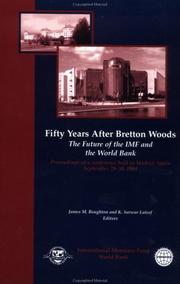
ISBN: 155775487X 9781455295098 1455295094 9781557754875 1462308872 1455298204 1283534134 9786613846587 Year: 1995 Publisher: Washington IMF
Abstract | Keywords | Export | Availability | Bookmark
 Loading...
Loading...Choose an application
- Reference Manager
- EndNote
- RefWorks (Direct export to RefWorks)
This volume, edited by James M. Boughton and K. Sarwar Lateef, contains the proceedings of a conference held in Madrid, Spain, in 1994, by the IMF and the World Bank to commemorate the fiftieth anniversary of the Bretton Woods conference of July 1944 that created the two institutions. The conference provided a forum for reflection and for reassessing the roles of the institutions as they approach the twenty-first century.
AA / International- internationaal --- LDC / Developping Countries - Pays En Développement --- 333.164.0 --- 333.432.8 --- NBB congres --- International finance --- -332.152 --- Fc5.3 --- International monetary system --- International money --- Finance --- International economic relations --- Internationale Bank voor Herstel en Ontwikkeling: algemeen. --- Internationale monetaire organisatie. Internationaal Muntfonds. Algemene leningovereenkomsten. --- World Bank --- International Monetary Fund --- Internationaal monetair fonds --- International monetary fund --- Conferences - Meetings --- 332.152 --- Internationale Bank voor Herstel en Ontwikkeling: algemeen --- Internationale monetaire organisatie. Internationaal Muntfonds. Algemene leningovereenkomsten --- International Monetary Fund. --- World Bank. --- IMF. --- Világbank --- Banque internationale pour la reconstruction et le développement --- Mezhdunarodnyĭ bank dli︠a︡ rekonstrukt︠s︡ii i razvitii︠a︡ --- MBRR --- Sekai Ginkō --- Kokusai Fukkō Kaihatsu Ginkō --- Kukche Puhŭng Kaebal Ŭnhaeng --- Segye Ŭnhaeng --- IBRD --- Welt Bank --- Weltbank --- Banque mondiale --- Internationale Bank für Wiederaufbau und Entwicklung --- Banco Internacional de Reconstrucción y Fomento --- Banco Mundial --- B.I.R.D. --- BIRD --- Banca Internațională pentru Reconstrucție și Dezvoltare --- Mirovoĭ Bank --- Svitovyĭ Bank --- Svitovyĭ bank rekonstrukt︠s︡iï i rozvytku --- Verdensbanken --- Międzynarodowy Bank Rozwoju i Odbudowy --- Bank al-Dawlī lil-Inshāʼ wa-al-Taʻmīr --- Bank al-Dawlī --- Världsbanken --- Banca ricostruzione e sviluppo --- Banca di ricostruzione e sviluppo --- BIRF --- I.B.R.D. --- B.I.R.F. --- Shih chieh yin hang --- Shi jie yin hang --- International Bank for Reconstruction and Development --- World Bank Group. World Bank --- Thanākhān Lōk --- Bank Światowy --- Viśva Baiṅka --- Lōka Băṅkuva --- Ngân hàng Thế giới --- Vsemirnyĭ Bank --- Bank Dunia --- Msopʻlio Bankis --- Banca Mondială --- BM --- Prapañca Byāṅku --- Banca mondiale --- Banca internazionale per la ricostruzione e lo sviluppo --- Dhanāgār Bibhab Lok --- البنك الدولي --- بنك الدولي --- 世界銀行 --- 世界银行 --- 国際復興開発銀行 --- Dėlkhiĭn Bank --- Дэлхийн Банк --- Hamashkharhayin Banki --- Svetska Banka --- Wereldbank --- Internationale bank voor herstel en ontwikkeling --- Banks and Banking --- Foreign Exchange --- Macroeconomics --- Money and Monetary Policy --- Social Services and Welfare --- Banks --- Depository Institutions --- Micro Finance Institutions --- Mortgages --- Monetary Systems --- Standards --- Regimes --- Government and the Monetary System --- Payment Systems --- Government Policy --- Provision and Effects of Welfare Program --- Education: General --- Aggregate Factor Income Distribution --- Currency --- Foreign exchange --- Banking --- Monetary economics --- Social welfare & social services --- Education --- Exchange rates --- Poverty reduction --- Poverty --- Money --- Managed exchange rates --- Banks and banking --- United States
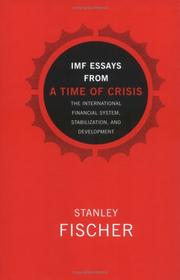
ISBN: 0262272709 1423729749 0262308800 9780262272704 9781423729747 0262062372 9780262062374 9780262308809 Year: 2004 Publisher: Cambridge, Mass. MIT Press
Abstract | Keywords | Export | Availability | Bookmark
 Loading...
Loading...Choose an application
- Reference Manager
- EndNote
- RefWorks (Direct export to RefWorks)
Stanley Fischer served as First Deputy Managing Director of the International Monetary Fund from 1994 to 2001. IMF Essays from a Time of Crisis collects sixteen essays written for the most part during his time at the IMF, each updated with Fischer's later reflections on the issues raised. The IMF drew much criticism for some of its actions during Fischer's tenure, and he vigorously defends the "battlefield medicine" practiced by the IMF during a series of economic crises, which included the problems of economic transition in the former Soviet bloc and the Asian financial crisis. Fischer addresses the subsequent calls for reform of the international financial system and makes the case for the IMF as an international lender of last resort.The first section of essays, "The Role of the IMF and the Reform of the International Financial System," considers the IMF's role in the international financial system in light of the crises of the 1990s. The second section, "Macroeconomic Policy, Stabilization, and Transition," examines such topics as exchange rate regimes, inflation, and Eastern Europe's relation to the European Union. The final section, "Poverty and Development," reflects Fischer's basic belief that economic policies should explicitly target poverty reduction. These engaging and accessible essays will appeal not only to economics students, economists, and policymakers but also to the general reader interested in the international monetary system.
Monetary policy --- Economic stabilization --- Foreign exchange rates --- International Finance --- Finance --- Business & Economics --- International Monetary Fund. --- Internationaal monetair fonds --- International monetary fund --- ECONOMICS/Finance --- ECONOMICS/Macroeconomics --- ECONOMICS/International Economics --- 332.042 --- 330.540 --- 331.162.21 --- 333.111.6 --- 333.164.0 --- 333.432.8 --- 333.613 --- AA / International- internationaal --- Socialistische stelsels: algemeenheden --- Geschiedenis van de centrale banken --- Betrekkingen van de centrale banken met de overheid. Voorschotten aan de overheid. Monetaire financiering van de schatkist --- Internationale Bank voor Herstel en Ontwikkeling: algemeen --- Internationale monetaire organisatie. Internationaal Muntfonds. Algemene leningovereenkomsten --- Activiteiten van de nationale en internationale markten. Beursnoteringen van aandelen en obligaties --- IMF.
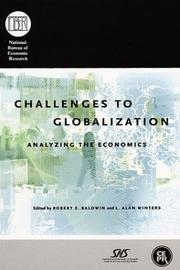
ISBN: 0226036154 0226036162 9786611125295 1281125296 0226036553 9780226036557 9780226036168 9781281125293 9780226036151 6611125299 Year: 2004 Publisher: Chicago, Ill. University of Chicago
Abstract | Keywords | Export | Availability | Bookmark
 Loading...
Loading...Choose an application
- Reference Manager
- EndNote
- RefWorks (Direct export to RefWorks)
People passionately disagree about the nature of the globalization process. The failure of both the 1999 and 2003 World Trade Organization's (WTO) ministerial conferences in Seattle and Cancun, respectively, have highlighted the tensions among official, international organizations like the WTO, the International Monetary Fund (IMF), the World Bank, nongovernmental and private sector organizations, and some developing country governments. These tensions are commonly attributed to longstanding disagreements over such issues as labor rights, environmental standards, and tariff-cutting rules. In addition, developing countries are increasingly resentful of the burdens of adjustment placed on them that they argue are not matched by commensurate commitments from developed countries. Challenges to Globalization evaluates the arguments of pro-globalists and anti-globalists regarding issues such as globalization's relationship to democracy, its impact on the environment and on labor markets including the brain drain, sweat shop labor, wage levels, and changes in production processes, and the associated expansion of trade and its effects on prices. Baldwin, Winters, and the contributors to this volume look at multinational firms, foreign investment, and mergers and acquisitions and present surprising findings that often run counter to the claim that multinational firms primarily seek countries with low wage labor. The book closes with papers on financial opening and on the relationship between international economic policies and national economic growth rates.
International economic relations --- Globalization. --- Human rights. --- Income distribution. --- International economic relations. --- Pressure groups. --- AA / International- internationaal --- 338.048 --- 333.164.0 --- 333.432.8 --- 382.11 --- 338.6 --- Fusies van ondernemingen. Industriële concentratie. --- Internationale Bank voor Herstel en Ontwikkeling: algemeen. --- Internationale monetaire organisatie. Internationaal Muntfonds. Algemene leningovereenkomsten. --- Theorie van het internationale evenwicht. Economische onafhankelijkheid van een natie. Globalisering. Mondialisering. --- Wetenschappelijk onderzoek en ontwikkeling. --- International Commerce --- Commerce --- Business & Economics --- Basic rights --- Civil rights (International law) --- Human rights --- Rights, Human --- Rights of man --- Economic policy, Foreign --- Economic relations, Foreign --- Economics, International --- Foreign economic policy --- Foreign economic relations --- Interdependence of nations --- International economic policy --- International economics --- New international economic order --- Distribution of income --- Income inequality --- Inequality of income --- Advocacy groups --- Interest groups --- Political interest groups --- Special interest groups (Pressure groups) --- Global cities --- Globalisation --- Internationalization --- Law and legislation --- Human security --- Transitional justice --- Truth commissions --- Economic policy --- International relations --- Economic sanctions --- Distribution (Economic theory) --- Disposable income --- Functional representation --- Political science --- Representative government and representation --- Lobbying --- Policy networks --- Political action committees --- Social control --- Anti-globalization movement --- Globalization --- Pressure groups --- Income distribution --- E-books --- Internationale Bank voor Herstel en Ontwikkeling: algemeen --- Internationale monetaire organisatie. Internationaal Muntfonds. Algemene leningovereenkomsten --- Fusies van ondernemingen. Industriële concentratie --- Wetenschappelijk onderzoek en ontwikkeling --- Theorie van het internationale evenwicht. Economische onafhankelijkheid van een natie. Globalisering. Mondialisering --- global, controversy, controversial, academic, scholarly, research, wto, world trade organization, conference, seattle, cancun, imf, international monetary fund, bank, banking, sector, public, private, government, nongovernmental, country, labor, rights, environmental, tariff, developed, relationships, globalist, democracy, wages, workplace, multinational, economic.
Book
ISBN: 9780521147378 9780521768344 0521147379 Year: 2011 Publisher: Cambridge: Cambridge university library,
Abstract | Keywords | Export | Availability | Bookmark
 Loading...
Loading...Choose an application
- Reference Manager
- EndNote
- RefWorks (Direct export to RefWorks)
[2017] Now in its third edition, this leading undergraduate textbook has been revised and updated throughout to take account of recent developments in world politics. Concise and engagingly written, the book is core reading for courses on international organizations, international law and politics, and global governance. Unlike other textbooks in the field, it takes readers behind the scenes of the world's most important international institutions to explore their legal authority and the political controversies that they generate. It presents chapter-length case studies of the world's leading international organizations, with attention to the legal, political, and practical aspects. The new edition adds depth to the discussion of international relations theory and features new case material on Brexit, the Argentine sovereign debt, the Syrian war, the cholera epidemic in Haiti, and more. Revised and updated throughout to take account of recent developments in world politics to see the changing law and politics of international organizations ; Includes new material on subjects such as Brexit, the Argentine sovereign debt, the Syrian war and the cholera epidemic in Haiti ; Up-to-date, topical and extensive case studies show students how each international organization works in practice, and chapters end with a list of discussion questions to guide student discussion, suggestions for further reading and excerpts from key legal documents
International agencies --- International organization --- 341.15 --- 333.164.0 --- 327.7 --- Organisatie van de Verenigde Naties. --- Internationale Bank voor Herstel en Ontwikkeling: algemeen. --- Internationale activiteiten. Internationale organisaties. Internationale verdragen--(internationale politiek) --- 327.7Internationale organisatie: algemeenheden. --- 327.7 Internationale activiteiten. Internationale organisaties. Internationale verdragen--(internationale politiek) --- politieke organisaties, internationaal --- 332.9 --- 333.432.8 --- 334.150.0 --- 334.81 --- 341.10 --- AA / International- internationaal --- Federation, International --- Global governance --- Interdependence of nations --- International administration --- International federation --- Organization, International --- World federation --- World government --- World order --- World organization --- Congresses and conventions --- International relations --- Peace --- Political science --- International cooperation --- Security, International --- World politics --- Associations, International --- IGOs (Intergovernmental organizations) --- Institutions, International --- Intergovernmental organizations --- International associations --- International governmental organizations --- International institutions --- International organizations --- International unions --- Organizations, International --- Specialized agencies of the United Nations --- Interorganizational relations --- Non-state actors (International relations) --- Internationale organisatie, reglementering en wetgeving van de arbeid --- Internationale Bank voor Herstel en Ontwikkeling: algemeen --- Internationale monetaire organisatie. Internationaal Muntfonds. Algemene leningovereenkomsten --- Institutionele aspecten EG: algemeenheden --- Wereldhandelsorganisatie (WHO). Algemene overeenkomst voor handel en tarieven (GATT) --- Internationale organisatie: algemeenheden --- Organisatie van de Verenigde Naties --- International relations. Foreign policy --- Organization theory --- Institutionele aspecten EG: algemeenheden. --- International agencies. --- International organization. --- Inter-governmental organizations
Book
ISBN: 0810878658 081087864X 9780810878655 9780810878648 Year: 2014 Publisher: Lanham Toronto Plymouth Scarecrow Press
Abstract | Keywords | Export | Availability | Bookmark
 Loading...
Loading...Choose an application
- Reference Manager
- EndNote
- RefWorks (Direct export to RefWorks)
This second edition of the Historical Dictionary of the World Bank shows the substantial progress the Bank has made, this mainly through the dictionary section with concise entries on its component institutions, related organizations, its achievements in various fields, some of the major projects and member countries, and its various presidents. The introduction explains how the Bank works while the chronology traces the major events over nearly 70 years. Meanwhile, the list of acronyms reminds us just who the main players are.
International finance --- World Bank --- History --- E-books --- Világbank --- Banque internationale pour la reconstruction et le développement --- Mezhdunarodnyĭ bank dli︠a︡ rekonstrukt︠s︡ii i razvitii︠a︡ --- MBRR --- Sekai Ginkō --- Kokusai Fukkō Kaihatsu Ginkō --- Kukche Puhŭng Kaebal Ŭnhaeng --- Segye Ŭnhaeng --- IBRD --- Welt Bank --- Weltbank --- Banque mondiale --- Internationale Bank für Wiederaufbau und Entwicklung --- Banco Internacional de Reconstrucción y Fomento --- Banco Mundial --- B.I.R.D. --- BIRD --- Banca Internațională pentru Reconstrucție și Dezvoltare --- Mirovoĭ Bank --- Svitovyĭ Bank --- Svitovyĭ bank rekonstrukt︠s︡iï i rozvytku --- Verdensbanken --- Międzynarodowy Bank Rozwoju i Odbudowy --- Bank al-Dawlī lil-Inshāʼ wa-al-Taʻmīr --- Bank al-Dawlī --- Världsbanken --- Banca ricostruzione e sviluppo --- Banca di ricostruzione e sviluppo --- BIRF --- I.B.R.D. --- B.I.R.F. --- Shih chieh yin hang --- Shi jie yin hang --- International Bank for Reconstruction and Development --- World Bank Group. World Bank --- Thanākhān Lōk --- Bank Światowy --- Viśva Baiṅka --- Lōka Băṅkuva --- Ngân hàng Thế giới --- Vsemirnyĭ Bank --- Bank Dunia --- Msopʻlio Bankis --- Banca Mondială --- BM --- Prapañca Byāṅku --- Banca mondiale --- Banca internazionale per la ricostruzione e lo sviluppo --- Dhanāgār Bibhab Lok --- البنك الدولي --- بنك الدولي --- 世界銀行 --- 世界银行 --- 国際復興開発銀行 --- Dėlkhiĭn Bank --- Дэлхийн Банк --- Hamashkharhayin Banki --- Svetska Banka --- Wereldbank --- Internationale bank voor herstel en ontwikkeling
| Listing 1 - 10 of 42 | << page >> |
Sort by
|

 Search
Search Feedback
Feedback About UniCat
About UniCat  Help
Help News
News